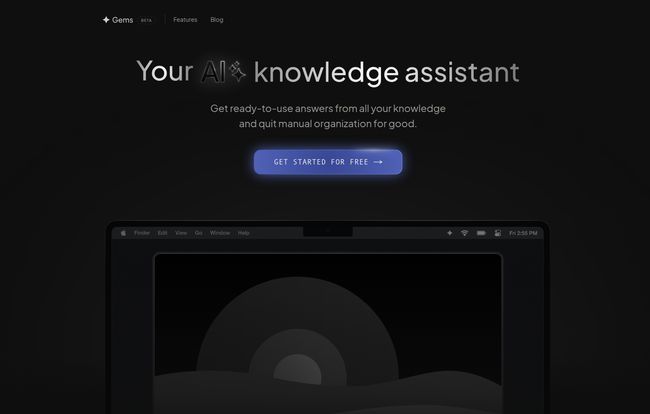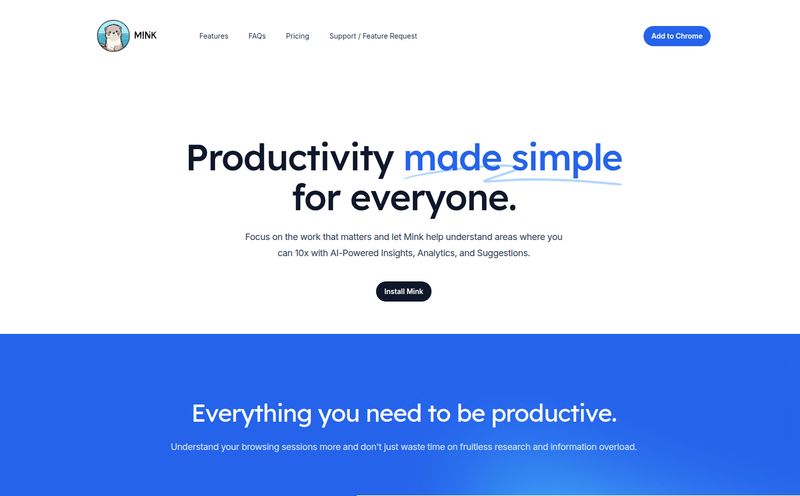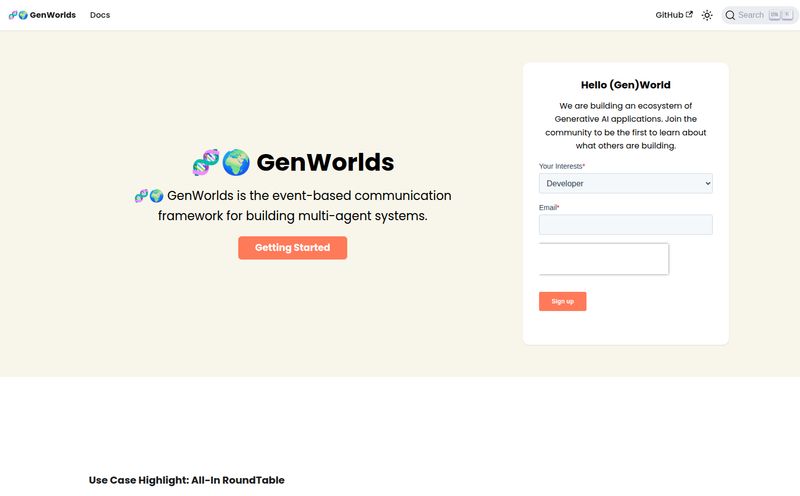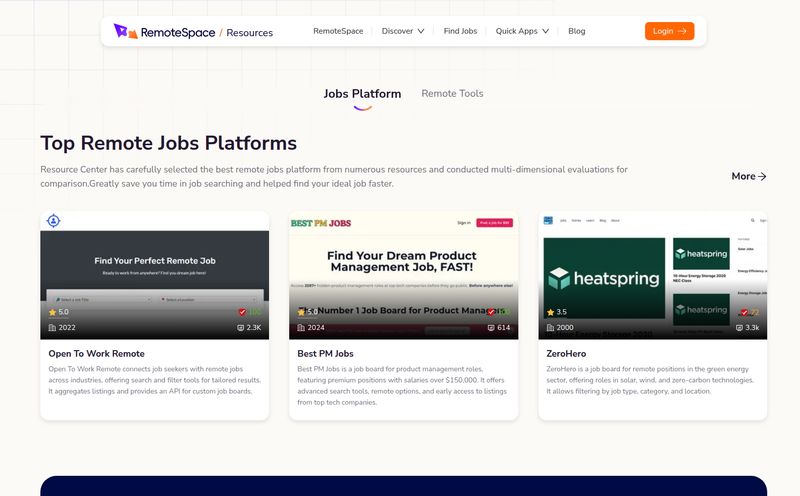My digital life is a mess. It's not for lack of trying, mind you. I've got Notion databases that would make a librarian weep, Slack channels for every thought that flits through my head, and a Gmail inbox that’s… well, it’s a Gmail inbox. The information is all there, somewhere. But finding that one specific client comment from three months ago? Or that brilliant idea I Slacked to myself at 2 AM? Good luck. It’s like owning a massive library where all the books have been thrown on the floor.
For years, the productivity world has been screaming at us to get organized. Build a “second brain!” they say. Use the PARA method! Try Zettelkasten! And I have. I’ve spent more weekends organizing my digital files than I care to admit. But what if the problem isn’t organization? What if the problem is retrieval?
That’s the question a new tool called Gems seems to be asking. It’s not another app to organize. Instead, it’s an AI knowledge assistant that connects to the apps you already use and promises to find the answers for you. No folders, no tags, no manual labor. Just ask a question. My interest was definitely piqued.
So, What Exactly Is Gems, Anyway?
Think of Gems less like a new filing cabinet and more like a brilliant, slightly psychic researcher who has read everything you've ever saved. You connect it to your digital haunts—your Notion, your Gmail, your Slack—and it ingests all that information. From that point on, you don't go digging through those apps anymore. You just ask Gems.
It’s an AI layer that sits on top of your existing knowledge. You can ask in natural language, "What were the key takeaways from the Q3 marketing meeting?" and instead of you having to remember if that was in an email, a Slack thread, or a Notion doc, Gems synthesizes an answer based on all of them. And, crucially, it shows its work, citing the source documents. It's a shortcut to your own knowledge. A crazy, powerful idea if it works.

Visit Gems
How Gems Actually Changes the Daily Grind
The promise is one thing, but how does it feel in practice? After playing around with it, a few things stood out to me as potential game-changers for my own chaotic workflow.
Finally, an Escape from Organization Purgatory
I have a love-hate relationship with organizing my notes. On one hand, a perfectly structured Notion workspace is a thing of beauty. On the other, maintaining it is a part-time job. The mental load of deciding 'Is this a project, an area, a resource, or an archive?' is exhausting. Gems basically sidesteps this entire debate. The philosophy here is: just dump your thoughts, docs, and conversations where they naturally live. The AI will sort it out later. This feels… liberating. A bit scary, but mostly liberating.
Finding That Needle in a Digital Haystack
Here’s a real-world scenario. A client emails me asking about a pricing detail we discussed on a Slack call two months ago. My old process would be:
- Search Gmail for the client's name. Skim 50 emails.
- Panic.
- Search Slack for the client's name. Get a thousand irrelevant results.
- Search my Notion meeting notes. Maybe I wrote it down?
- Give up and sheepishly ask the client to remind me.
The Gems promise is that I can just ask, "What pricing did I quote [Client Name] in our Slack call?" and it will spit out the answer, along with a link to the original Slack message. That single function could save me hours of frantic searching each month.
Sharing Knowledge Without the Copy-Paste Dance
Another neat touch is how it handles sharing. You can quickly pull information from your various sources, have Gems synthesize it, and then paste it directly into whatever app you’re working in. For teams, you can create shared “spaces” where everyone can query a collective pool of knowledge. It’s a smart way to document processes and decisions without having to manually build a wiki from scratch.
The Nitty-Gritty: My Honest Take
Alright, no tool is perfect, especially one still in Beta. I'm an optimist, but I’m also a seasoned SEO who's seen a lot of tech fads come and go. Gems has some truly brilliant aspects, but there are also a few things that give me pause.
The “aha!” moment for me was when I asked it a vague question about a past project, and it pulled a key detail from a one-line comment in a Google Doc I had completely forgotten existed. That felt like magic. It’s not just finding documents; it’s understanding the content within them. The fact that it provides sources is a massive trust-builder. It’s not just some black box AI making things up; it’s showing you the digital breadcrumbs it followed. That's a huge plus in my book.
However, let's be real. The effectiveness of Gems is directly proportional to the quality of the data you feed it. As the old saying goes, garbage in, garbage out. If your Notion is a wasteland of untitled pages and your Slack is 90% memes, Gems won’t be able to work miracles. It can’t synthesize knowledge that isn’t there. Also, the big elephant in the room is privacy. Giving an AI access to your entire digital life, including personal emails, requires a significant leap of faith. While Gems likely has security protocols, it's a barrier some people just won't be comfortable crossing, and that's perfectly understandable. I, for one, am proceeding with cautious optimism.
Let's Talk Money: The Gems Pricing Breakdown
So, what does this AI-powered brain assistant cost? The pricing structure is refreshingly straightforward, which I appreciate. They have a few tiers that cater to different types of users.
| Plan | Price | Key Features |
|---|---|---|
| Free | $0 / month | Unlimited interactions, but only one app integration. Includes Mac & Windows apps. |
| Plus | $8 / user / month (billed annually) | Unlimited interactions and two app integrations. Basic support. |
| Pro | $19 / user / month (billed annually) | Unlimited interactions, unlimited integrations, and premium support. |
My take? The Free plan is a no-brainer to test the waters. Connecting just one app (like your messiest one, probably Notion) gives you a solid feel for the magic. The Plus plan feels like the sweet spot for most serious individuals and freelancers. Two integrations cover the most common pairing, like Notion + Slack or Gmail + Slack. The Pro plan is clearly aimed at power users and small teams who are all-in on this centralized knowledge model and need to connect everything without limits.
Who Is This Really For? (And Who Should Pass?)
I've been in the SEO and digital marketing space for a long time, and I can see a clear profile for the ideal Gems user. If you're a knowledge worker, a researcher, a writer, a consultant, or part of a small, agile team that lives in apps like Slack, Notion, Figma or Gmail, this could seriously change your life. You're the person who already feels the pain of fragmented information.
On the flip side, who should maybe skip it for now? If you're not a heavy user of these kinds of digital tools, Gems won't have much to work with. If you have major privacy concerns about connecting your accounts, it’s probably not for you. And if you’re looking for a tool to create and organize notes from scratch, something like Notion or Obsidian is still your best bet. Gems doesn't replace them; it works with them.
My Final Verdict: The Future of Personal Knowledge?
After a few weeks, I’m genuinely excited about the potential here. Gems represents a shift in thinking about personal knowledge management (PKM). It moves the focus from meticulous, manual organization to effortless, intelligent retrieval. It's a subtle but powerful change.
Is it perfect? Nope. It’s still in Beta, its true power depends on your existing digital habits, and the privacy question is real. But it's one of the most interesting approaches to solving the 'information overload' problem I've seen in a long time. It feels less like another piece of software to manage and more like a genuine assistant. And my brain, with its million open tabs, is very, very grateful for that.
Frequently Asked Questions
How does Gems handle my data and privacy?
This is the big one. According to their approach, they use your information to provide answers, but the goal is to maintain security. However, as with any service that accesses personal data like Gmail, you should always review their latest privacy policy. It's a personal comfort-level decision.
What apps can I currently connect to Gems?
As of now, it connects with core knowledge hubs like Notion, Gmail, and Slack, with more likely on the way. The value grows with each new integration they add to their roster.
Is Gems just another ChatGPT wrapper?
Not really. While it uses AI, its primary function isn't to generate new content from the web like ChatGPT. Its job is to search and synthesize information from your private, connected sources. The context is your own data, which makes it a very different and more personal tool.
Can I use Gems with my team?
Yes. The pricing model is per-user, and it's designed with teams in mind. The ability to create shared spaces where the team can query collective knowledge (like a company's Notion and Slack) is one of its most powerful use cases.
Does Gems replace my note-taking app like Notion?
No, and that's important to understand. It's a complementary tool. You still need places like Notion, Slack, and Gmail to create and store the information. Gems is the layer on top that helps you find it all later without the headache.
What if my source data is a complete mess?
Gems will still work, but its answers might be less helpful. It can only find what exists. If your notes are vague or incomplete, the synthesized answers will reflect that. It might actually motivate you to take slightly better notes, knowing a powerful search tool is waiting to use them.
Reference and Sources
- Gems Official Website
- Gems Pricing Page
- A Primer on the PARA Method by Tiago Forte - For context on the organizational systems Gems helps you avoid.



